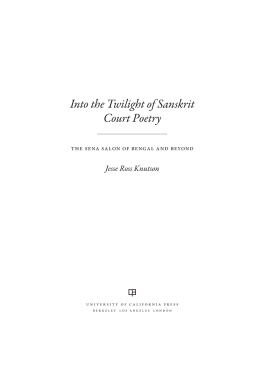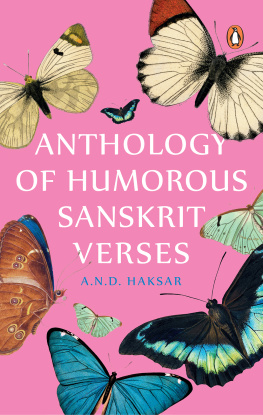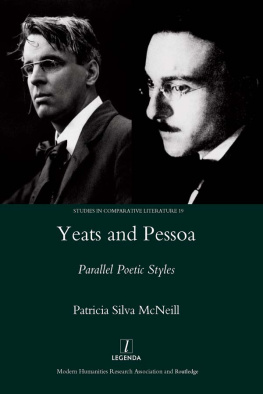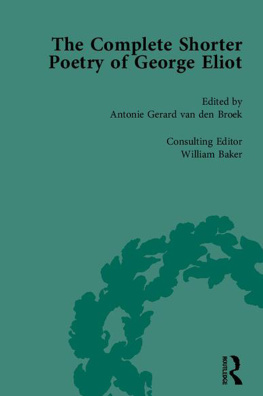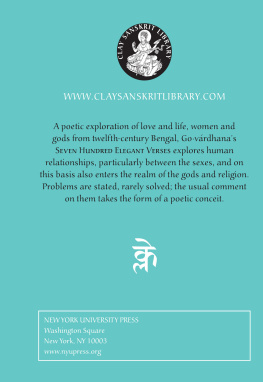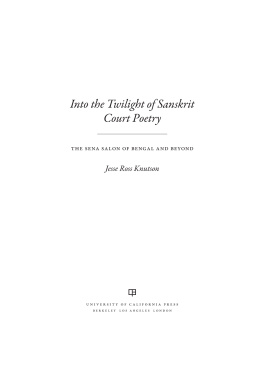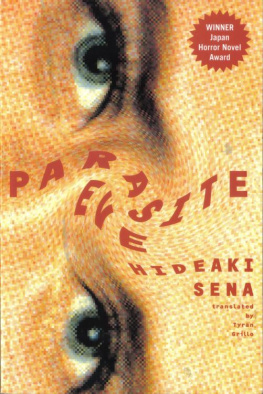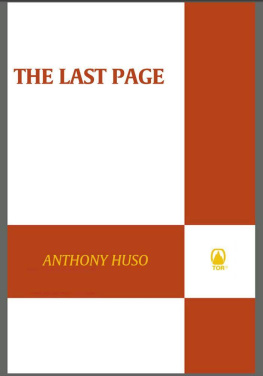ACKNOWLEDGMENTS
For endless love and support I thank Nandini Chandra, and my teacher, dear friend, confidante, and surrogate mother, Minati Kar.
Yigal Bronner read my dissertation with such dedication and profound engagement with every word that the present book really owes its birth to him; the same is also true, especially for particular parts, for my teachers Sheldon Pollock and Clinton Seely. I thank my original dissertation committee for its patience and kindness.
Robert P. Goldman and Sally J. Sutherland-Goldman have both been inspiring gurus and leaders from the beginning of my studies to the present, so generous with their support; without them I could not have begun on this path, nor survived as long as I have.
Thanks to Ram Karan Sharma and Annapurna Sharma, extremely loving and nurturing people. Professor Sharma has been one of my most nurturing Sanskrit teachers since the beginning, as well as a teacher of how to be a human beingwhen in doubt I try to focus on his supreme example.
Thanks to Pandit Satyapada Bhattacharya; Tapasri-didi, librarian at the Sanskrit College, Kolkata; Rabiranjan Chattopadhyaya; Mandira Bhaduri; Anjan Sen; Shubha Chakravarti-Dasgupta; Apurbo Shaha; Kunal and Shubhra Chakrabarti; Gary Tubb; Larry McCrea; Pandit Venugopalan; Madhav Bhandare; Shailaja Katre; Ben Baer; Travis Smith; Deven Patel; Indira Viswanathan Peterson; Alicia Czaplewski; David Shulman; Muzaffar Alam; Richard Salomon; Thomas Trautmann; David Mellins; Stefan Baums; Daud Ali; Adheesh Sathaye; Blake Wentworth; Whitney Cox; Guriqbal (Bali) Sahota; Poonam Srivastava; Dipankar Basu; Priyanka Srivastava; Nusrat Chowdhury; Matt Rich; Rokeya; Rihan Yeh; Socrates Silva; Sydney Silverstein; Christa Mohn; Chloe Crepau; Eric Bain; Ethan Kroll; Mr. and Mrs. Majumdar, 14 Shyamananda Road; Shakti Sadhan and Aparna Chandra; Anju, Sanjay, Gama, Chom, Oni, Mahua, Misha, Jaylynne, Aidan; my father, Jack Knutson; my mother, Susan Guild; Tish; B.J. Thorsness; my brothers, Kirk Knutson and Jubal Thorsness; Changhwan Park; Kyung-Seo Jan; Hawon Ku; Travis Smith; Petere Milne; Christian Baier; Goran Marinovic; Paul Mullins; Nancy Jho; and Theo.
Thanks to dear friends Aaron Macabee and Amshuman (Bumba) Mukherjee, who brought a lot of joy into the world and left it mixed with sorrow for their loss. In memoriam to Kumkum Chatterjee, whom I knew only a short time, but who gave me such infinite support and affection in this brief time: she was truly an exceptional human being, too good for this world.
Thanks to the American Institute of Indian Studies; the American Council of Learned Societies/Mellon New Faculty Fellowship, and my fellowship host and alma mater, the Department of South and Southeast Asian Studies, University of California, Berkeley; Seoul National Universitys newly forming department of Asian Languages and Civilizations; Rajasthan Oriental Research Institute, Alwar and Jodhpur; Jawaharlal Nehru University Library; Delhi University Library; and Kolkata Sanskrit College Library. Finally, thanks to all my new colleagues at the University of Hawaii at Manoa, who have been without exception as warm and comforting as the beautiful weather. I give my heartfelt thanks to the anonymous reviewers who gave me such sincere and valuable help. Deep thanks also to my copyeditor, Caroline Knapp, who with great delicacy and subtlety refined the language, as well as to all the great people I have had the joy of working with at University of California Press. And last but not least, thanks to Amit Chaturvedi for some truly crucial help through the final steps.
Introduction
Speech whose flavor is suited to Prakrit has been here forcefully drawn into Sanskrit, as if the Yamun, whose waters naturally flow downward, were dragged forcibly to the firmament of the sky/just as Balarma dragged the Yamun upward.
GOVARDHANA, RYSAPTAAT, I.52
AT THE TURN OF THE twelfth century into the thirteenth, at the court of King Lakmaasena of Bengal, Sanskrit poetry showed profound and sudden changes: a new social scope made its definitive entrance into high literature. Courtly and pastoral, rural and urban, cosmopolitan and vernacular components confronted each other in a commingling of high and low styles. This was not the work of an obscure avant-garde. Some of this literature enjoyed vast popularity, as manuscript diffusion, traditions of literary imitation, and visual art attest.
AUTHORS, TEXTS, POETIC AND HISTORICAL DYNAMICS
This movement was at once mainstream and liminal. The poet Govardhana, from whose rysaptaat ( Collection of Seven Hundred ry Verses ) the above epigraph comes, forged a consolidation of literary registers alongside sustained metapoetic commentary, elaborately characterizing his new composite register. In the epigraph above, through the figure of paronomasia or bitextuality ( lea ), Govardhana references the story of Kas elder brother, Balarma, refusing, in a drunken fit, to descend for a drink of water, and

